

When you wake up on the morning, many of the functions have only just
started to accelerate. Your heart rate is still slow, your body temperature
is still relatively low, your muscles are stiff and your mind is not yet
fully alert. Rather than reaching for a stimulant like coffee, take five
minutes to perform a series of morning stretches. They will not only arouse
your neuromuscular system, but they will help you maintain a sense of
relaxation.
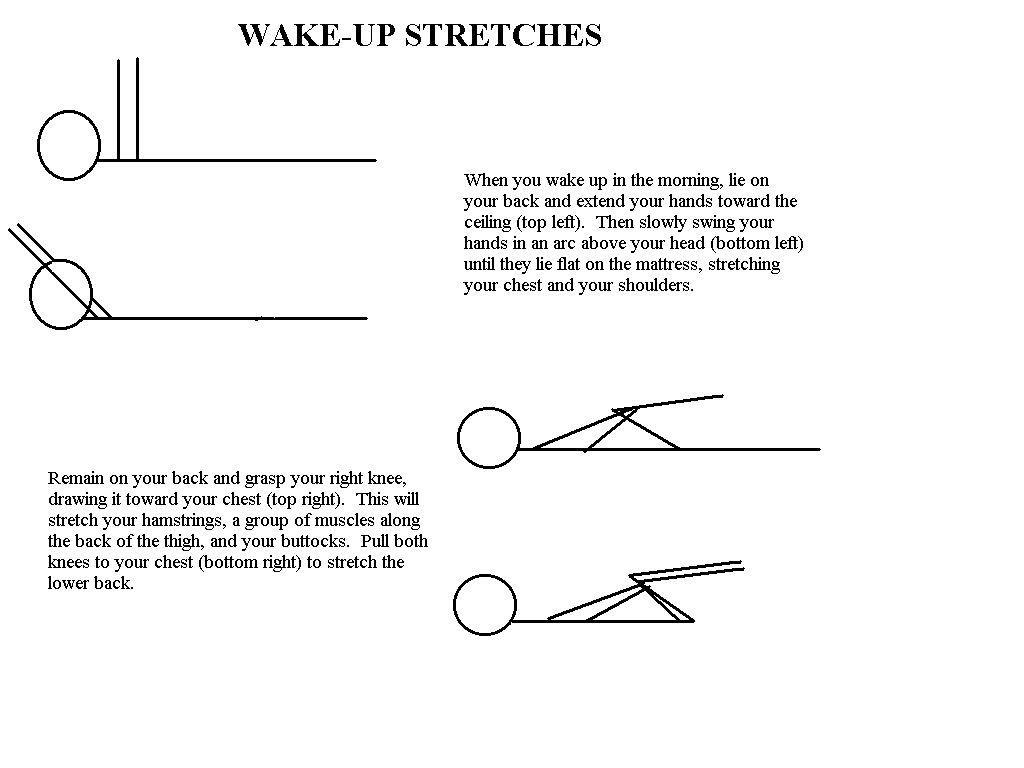
Mastering Tai Chi requires a knowledgeable teacher. But you can get a good
sense of Tai Chi's benefits by moving through this sequence of classic
postures, shown with their Chinese names. Practice one or two at a time
until you can perform them fluidly. Then move onto another short sequence.
Note the positions of the hands and feet, and keep your back straight.
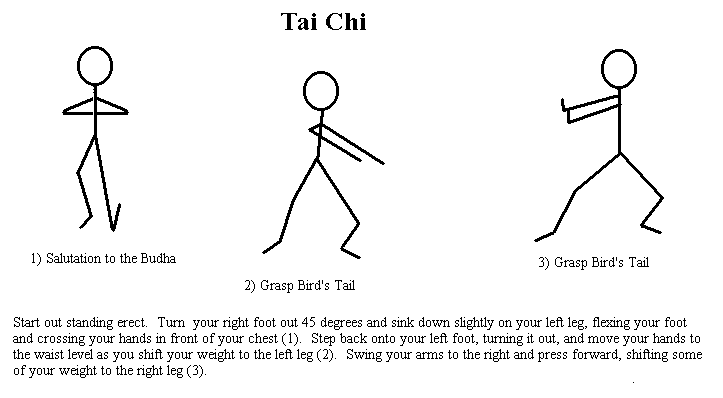
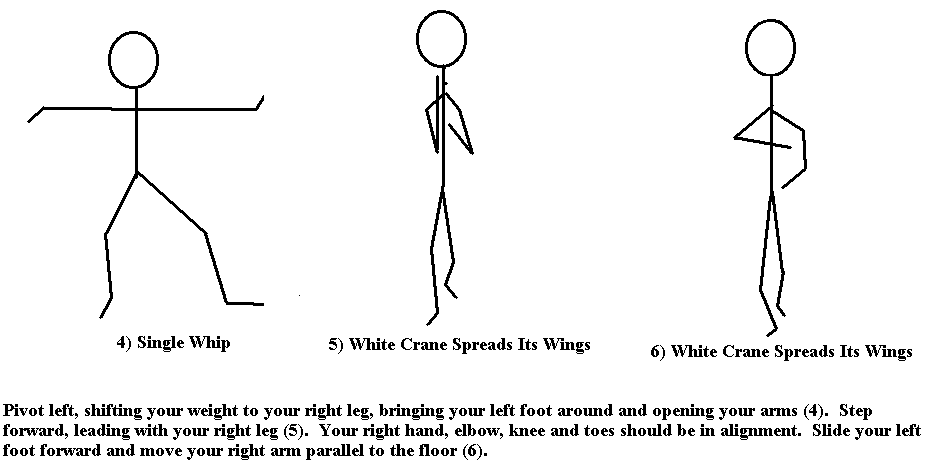
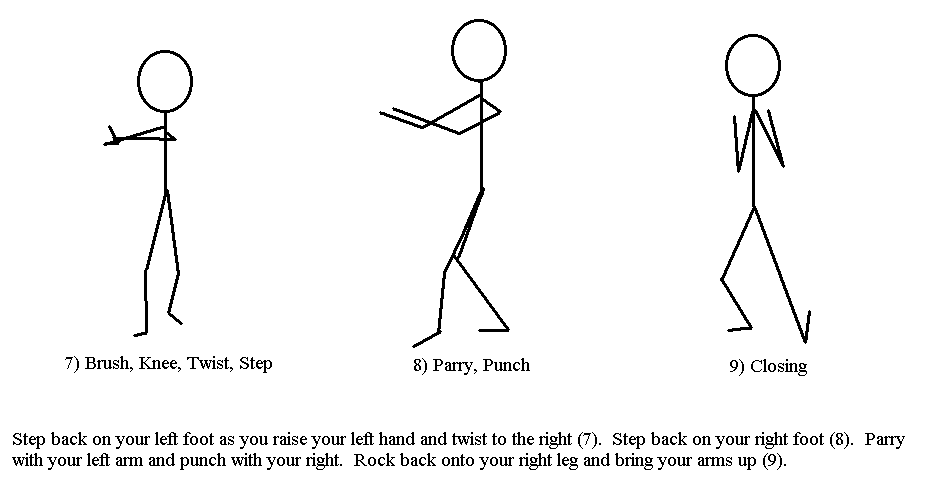
There are many philosophies of meditation, each with its own set of
techniques. 10 to 20 minutes of meditation are recommended in the morning
and then again later in the day. Each time, you should follow these simple
guidelines. First, you need a quiet environment where you will be
undisturbed. Some people find that darkening a room or closing their eyes
helps them meditate, while others prefer a dimly lit space. And some
meditators want silence, while others prefer soft music or sounds. Second, a
comfortable position is important---one that you can assume for at least 20
minutes without feeling strained or numb and that also keeps you from
falling asleep. Third, you need a device to fix your attention on. This can
be a mantra-a word, sound or phrase repeated each time you exhale. Or you
can fix your gaze on a stationary object. Breathing slowly and rhythmically
also helps you focus your thoughts. Finally, adopt a passive attitude: Do
not worry about how well you are doing. At first your mind may wander, but
with practice you will be able to focus for longer periods, enhancing your
ability to produce the response.
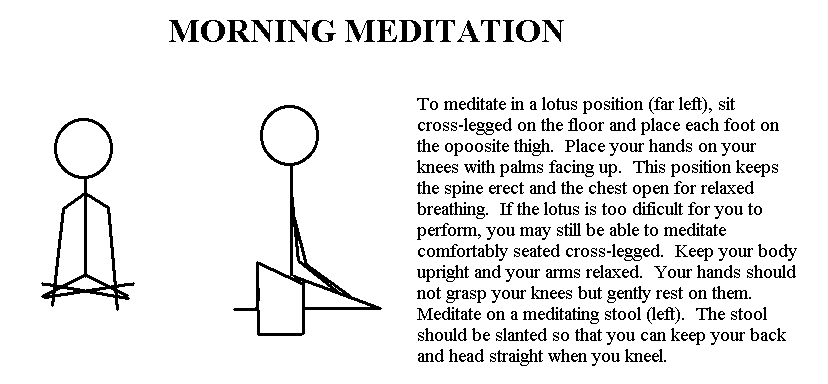
People who manage stress well have learned how to deal with difficult situations, anxiety and on-going pressures. Here are some suggestions from ParticipACTION about how you can take action against stress.
Sharing your feelings and problems with family members and friends is often the best way to cope with stress. Other support systems, such as self-help groups, employee assistance programs or professional counselling can also help.
People who feel good about themselves and have some sense of control over their lives tend to deal with stress well. They look and feel healthy because they take care of themselves. Decide to treat yourself well: stay active, eat well, take time to relax, rest and enjoy some good times with friends and family. Tell yourself that you are okay.
People who cope well use humour to relax, to release tension and anger, and to find the positive in a stressful situation. Seek out people who make you laugh; rent a funny movie; send a humourous memo.
Positive thinking is the key to approaching life-and stress-as a challenge to be enjoyed. Positive thinking is giving yourself the go-ahead to succeed. Plan how you will handle a potentially stressful situation before it occurs. Then, use positive "self-talk" to assure yourself that you can deal with the situation. People who cope effectively look back on stressful events and say, " I learned from that experience; I am better because of it."
This is a simple, effective, easy to master exercise that combines
meditation and relaxation.
1. Sit quietly and in a comfortable position.
2. For the next 5, 10 or 15 minutes you are going to allow yourself to
relax and rebalance.
3. Relax your body - let the chair or floor support the heaviness of your
body.
4. Close your eyes.
5. Inhale through your nose and say "I am.."
6. Exhale through your mouth and say "RELAXED"
7. Continue to breathe normally and repeat, " I AM RELAXED" with each
breath.
8. Your mind will wander but gently return it to the statement "I AM
RELAXED" with your breathing.
9. Continue this exercise until you feel refreshed.
10. To finish, slowly open your eyes and stretch your hands, arms,
shoulders, back, legs, and feet.
11. You are now relaxed! Congratulations!
Although there are many ways of treating stress, I feel that the most practical method is the stress management technique. It is easy to do, does not require anything, and is almost guaranteed to work. If however, it does not work, I am a big fan of massage and aromatherapy. Although, I think that the two are just temporary methods of relief. The real lesson to be learned here is that if you eat right, exercise, take care of yourself, basically, just lead a healthy lifestyle then your body will function much better, both physically and mentally. It seems to me that everywhere I looked the methods all called for healthy lifestyles. Of course, there are ways of treating oneself without being fit. All of the other methods (accupressure, reflexology, drugs, etc.) will cure you for a short while but then what will protect you from getting stressed out again? If you lead this ideal healthy lifestyle then you will at least be better prepared to deal with any new stress that comes into your life.
Go Back to Stress Management Page